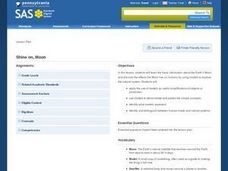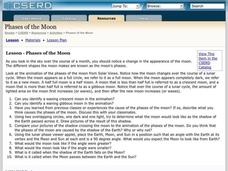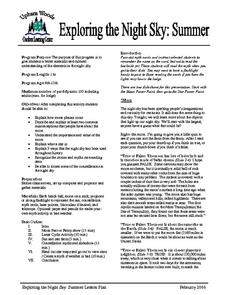Curated OER
Walk Two Moons: Hook and Concept of a Frame Story
As an introduction to Sharon Creexh's Walk Two Moons, a volunteer dons a pair of boots and walks about the classroom.Observers then ponder the axiom, Don't judge a man until you've walked two moons in his...
Clark County School District
Owl Moon by Jane Yolen
A thorough lesson plan takes your first grade class through Jane Yolen's beautiful Owl Moon. It crafts the unit with clear objectives, high-level guiding questions, cloze activities and sentence frames, and extension...
Journey Through the Universe
Our Solar System
Take your class on a journey through our solar system. Learners explore each planet, from Mercury to Pluto, and discuss various features that differentiate one from another. They complete activities related to the topics and discuss the...
McGraw Hill
Study Guide for Island of the Blue Dolphins
Dive your class into a reading of Island of the Blue Dolphins with this in-depth study guide. Breaking the novel into three parts, the resource begins each section with a focus activity that identifies a specific theme or question...
Curated OER
Making Regolith
You may not be able to take a field trip to the moon, but that doesn't mean your class can't study moon rocks. Using graham crackers as the moon's bedrock and powdered donuts as micrometeorites, young scientists simulate...
Curated OER
Designing a Crew Exploration Vehicle
Take your class on an out-of-this-world adventure with this fun engineering design instructional activity. Working in small groups, young scientists design, build, and test crew exploration vehicles using some creativity, teamwork,...
Curated OER
The Stuff of Stories: Using Museums to Inspire Student Writing
Middle schoolers write descriptions, narratives, and dialogues based on objects of art and time periods in a museum. They base several writing assignments on art objects and paintings, including a literal description and an emotional...
NASA
Providing Light for Your Plants
Using a guided lesson, pupils learn about what it takes to make a circuit along with a switch. They build a complete circuit under the direction from the teacher and identify each of the elements of the circuit. Scholars then learn to...
National Center for Case Study Teaching in Science
To Boldly Go, or Not
Here is a different way to combine social studies and science. Have your high schoolers read a passage about the 2004 vision for space exploration and then discuss the practicality, costs, and reasons for returning to the moon. Then, the...
Curated OER
Demonstrating Moon Phases
Third graders participate in a demonstration of the moon's phases. In this moon phase lesson, 3rd graders watch as the teacher demonstrates moon phases with a bright light and a Styrofoam ball. They answer questions associated with the...
Alabama Learning Exchange
The Moon
Young scholars explore the phases of the moon. In this solar system lesson, students listen to several books about the moon including The Moon Book by Gail Gibbons. Young scholars complete a KWL activity concerning the phases of the moon...
Institute of Electrical and Electronics Engineers
Biomimicry in Engineering
Take a look with your class at how nature supplies inspiration to engineers. In cooperative groups, youngsters research biomimicry and then develop a system that would help support people living on the moon. Each team also considers...
Curated OER
Tour of the Solar System
Learners engage in science, math, and language activities as they do research on the components of the solar system. The class begins with some anticipatory activities and discussions before it is divided into small groups to conduct...
Curated OER
Shine On, Moon
Pupils explore space science by conducting an experiment in class. In this Moon lesson, students define a list of space science vocabulary and read the book The Moon. Pupils utilize shoeboxes and string to conduct a sunlight experiment...
S2tem Centers SC
Seasons
Winter, spring, summer, and fall—take the learning of the seasons beyond the elementary level to the middle school classroom. Curious learners begin by watching videos about the seasons and the rotation of planet Earth. Then,...
Curated OER
Trip to Moon, Mars, or Wherever!
Students play a game relating to outer space. This game can be adapted for higher grades.
Workforce Solutions
A Colony for Lunar Living
Two lessons explore the possibility of living on the moon. First, scholars read various scenarios to identify which careers would best transfer to life in space. Finally, pupils examine a website to locate items made for outer space,...
Laboratory for Atmospheric and Space Physics
Space Travel Guide
Looking to take a trip? Why not go to space? Here, scholars take on the role as travel agent to create a guide to their favorite planet including travel tips and sightseeing recommendations.
University of Colorado
Space Travel Guide
Neptune takes 164.8 Earth years to travel around the sun. In the fifth of 22 lessons, young scientists create a travel guide to a planet in our solar system. They provide tips for others on what to bring, what they see, and their...
Florida International University
The Good, the Bad and the Nasty Tasting
Examine the benefits of chemical defense mechanisms. Organisms in oceans use chemicals to ward off predators. Duplicate this adaptation using a hands-on experiment in which you ward off your predators (your pupils) with some...
Curated OER
Phases of the Moon
Students create a model of the phases of the Moon by giving students pictures of the phases of the Moon, a picture of the Earth, and a picture of the Sun. They then take a picture, and stand in correct place to make the phases of the...
Curated OER
Phases of the Moon
Pupils determine the phases of the moon. They observe experiments to formulate explanations for moon phases. Students identify waxing crescent, waning gibbous, and the causes of the phases.
Curated OER
Spacecraft Launched on Mission to Pluto
Students read a news article about a space mission being launched to the planet Pluto. They study the necessary vocabulary and complete an anticipation guide of questions which they revisit after they read the article.
Curated OER
Exploring the Night Sky: Summer
Students explain how moon phases occur. They describe and explain at least two common misconceptions that people have about the moon. Students explain what a star is. They explain 3 ways that the night sky has been used throughout history.























